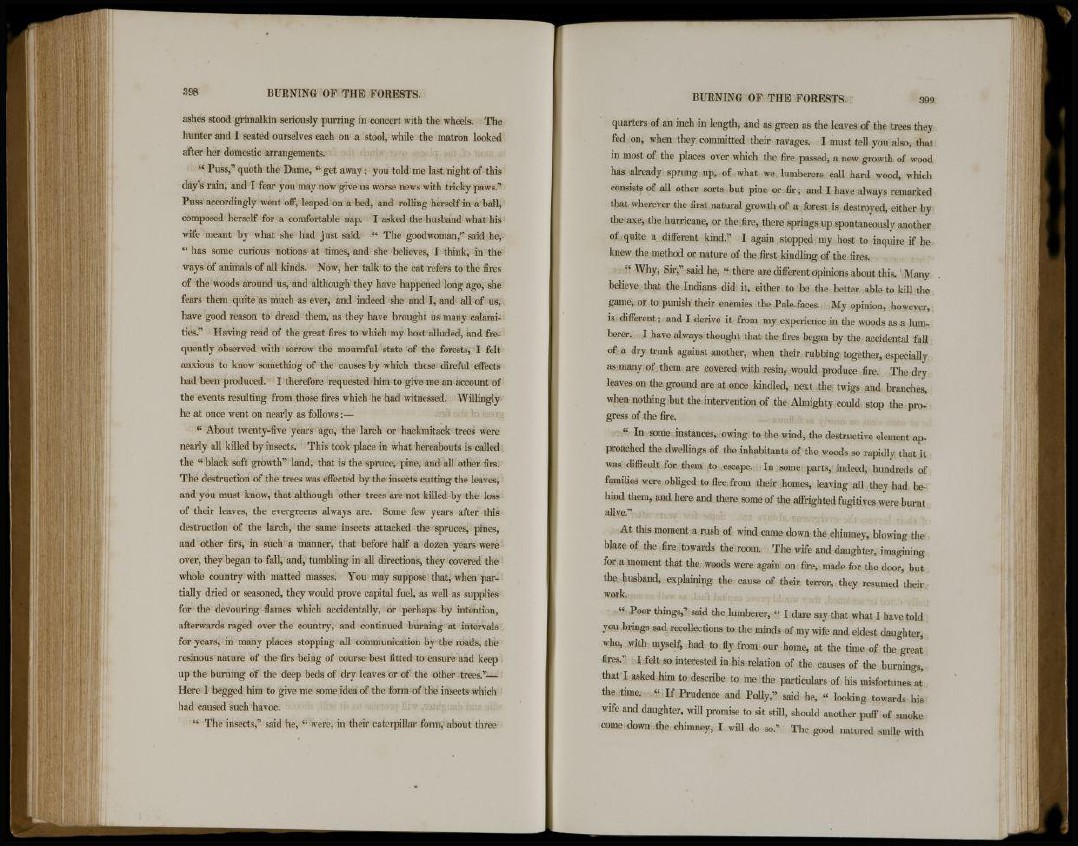
ashes stood grimalkin seriously purring in concert with the wheels. The
hunter and I seated ourselves each on a stool, while the matron looked
after her domestic arrangements.
" Puss," quoth the Dame, " get away; you told me last night of this
day's rain, and I fear you may now give us worse news with tricky paws."
Puss accordingly went off, leaped on a bed, and rolling herself in a ball,
composed herself for a comfortable nap. I asked the husband what his
wife meant by what she had just said. " The good woman,'1 said he,
" has some curious notions at times, and she believes, I think, in the
ways of animals of all kinds. Now, her talk to the cat refers to the fires
of the woods around us, and although they have happened long ago, she
fears them quite as much as ever, and indeed she and I, and all of us,
have good reason to dread them, as they have brought us many calamities.
1' Having read of the great fires to which my host alluded, and frequently
observed with sorrow the mournful state of the forests, I felt
anxious to know something of the causes by which these direful effects
had been produced. I therefore requested him to give me an account of
the events resulting from those fires which he had witnessed. Willingly
he at once went on nearly as follows :—
" About twenty-five years ago, the larch or hackmitack trees were
nearly all killed by insects. This took place in what hereabouts is called
the " black soft growth" land, that is the spruce, pine, and all other firs.
The destruction of the trees was effected by the insects cutting the leaves,
and you must know, that although other trees are not killed by the loss
of their leaves, the evergreens always are. Some few years after this
destruction of the larch, the same insects attacked the spruces, pines,
and other firs, in such a manner, that before half a dozen years were
over, they began to fall, and, tumbling in all directions, they covered the
whole country with matted masses. You may suppose that, when partially
dried or seasoned, they would prove capital fuel, as well as supplies
for the devouring flames which accidentally, or perhaps by intention,
afterwards raged over the country, and continued burning at intervals
for years, in many places stopping all communication by the roads, the
resinous nature of the firs being of course best fitted to ensure and keep
up the burning of the deep beds of dry leaves or of the other trees."—
Here I begged him to give me some idea of the form of the insects which
had caused such havoc.
" The insects," said he, " were, in their caterpillar form, about three
quarters of an inch in length, and as green as the leaves of the trees they
fed on, when they committed their ravages. I must tell you also, that
in most of the places over which the fire passed, a new growth of wood
has already sprung up, of what we lumberers call hard wood, which
consists of all other sorts but pine or fir; and I have always remarked
that wherever the first natural growth of a forest is destroyed, either by
the axe, the hurricane, or the fire, there springs up spontaneously another
of quite a different kind." I again stopped my host to inquire if he
knew the method or nature of the first kindling of the fires.
" Why, Sir," said he, *< there are different opinions about this. Many
believe that the Indians did it, either to be the better able to kill the
game, or to punish their enemies the Pale-faces. My opinion, however,
is different; and I derive it from my experience in the woods as a lumberer.
I have always thought that the fires began by the accidental fall
of a dry trunk against another, when their rubbing together, especially
as many of them are covered with resin, would produce fire. The dry
leaves on the ground are at once kindled, next the twigs and branches,
when nothing but the intervention of the Almighty could stop the progress
of the fire.
" In some instances, owing to the wind, the destructive element approached
the dwellings of the inhabitants of the woods so rapidly that it
was difficult for them to escape. In some parts, indeed, hundreds of
families were obliged to flee from their homes, leaving all they had behind
them, and here and there some of the affrighted fugitives were burnt
alive."
At this moment a rush of wind came down the chimney, blowing the
blaze of the fire towards the room. The wife and daughter, imagining
for a moment that the woods were again on fire, made for the door, but
the husband, explaining the cause of their terror, they resumed their
work.
" Poor things," said the lumberer, " I dare say that what I have told
you brings sad recollections to the minds of my wife and eldest daughter,
who, with myself, had to fly from our home, at the time of the great
fires." I felt so interested in his relation of the causes of the burnings,
that I asked him to describe to me the particulars of his misfortunes at
the time. " If Prudence and Polly," said he, " looking towards his
wife and daughter, will promise to sit still, should another puff of smoke
come down the chimney, I will do so." The good natural smile with